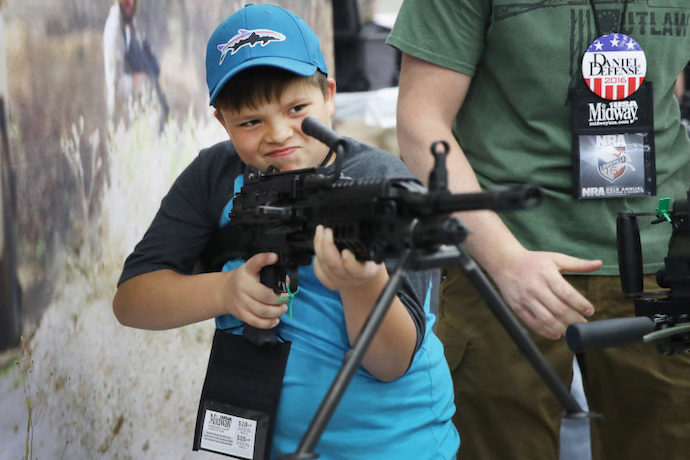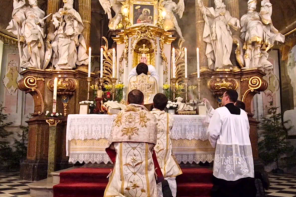Another day in these United States, another mass shooting. Before the country could even begin mourning the 21 human beings senselessly killed at a Walmart in El Paso, Texas on August 3rd, we learned that another nine human lives had been snuffed out in the wee hours of August 4th outside a popular bar called Ned Peppers in downtown Dayton, Ohio. Republican leaders continue to block any meaningful action from being taken. The heat wave continues. Department stores are experiencing the back-to-school rush. Water continues to be wet.
Republican obstruction of any realistic solutions to America’s numerous interrelated problems has become a depressing dog-bites-man story. But for the Senate Majority Leader (who has transitioned on Twitter from #MoscowMitch to #MassacreMitch) to continue to pull this off, he needs loyal foot soldiers to deliver messaging that appeals to the GOP base of white evangelicals, radical traditionalist Catholics, other Christian extremists, and white nationalists. And what this messaging, familiar to those of us who grew up in the Christian Right, tells us about the “soul” of the Republican Party is not pretty.
In an appearance on Fox News Sunday, Texas Lieutenant Governor Dan Patrick, a Republican, seemed to place most of the blame for mass shootings on violent video games. This is a position that, while reductionist and deflecting from the fact that gun control is demonstrably effective, I cannot dismiss as quickly as I once might have in the aftermath of Gamergate and what we’ve learned about rampant misogyny and white nationalist recruiting in online gaming spaces. In the same appearance, however, Patrick also lamented that “we won’t even let our kids pray in our schools,” including this supposed lack of school prayer among the “many factors that go into these shootings.”
Yes, this assertion that children are not allowed to pray in American public schools is patently untrue, an example of something that we could file under the hashtag #ChristianAltFacts. It is, however, patently untrue in a way that is highly familiar to me as an ex-evangelical, and in a way that very much feels true to Patrick’s target audience.
With Patrick’s gesture toward school prayer, we depart from the realm of mere deflection from realistic gun violence solutions and enter the realm of the conservative Christian jeremiad, a genre that links purported symptoms of national decline to spiritual causes. (To be clear, I hope we can all agree that frequent mass shootings are very much a real symptom of national decline, but many other examples cited in these conservative Christian laments are no such thing.)
It’s easy to adduce more specific examples. The issue of school shootings was used to advance Florida legislation requiring the display of “In God We Trust” in Florida public schools. And in response to the most recent massacres, Republican Ohio State Representative Candice Keller blamed “the breakdown of the traditional American family,” for which she in turn blamed same-sex marriage and the LGBTQ community, in a now-deleted Facebook post. Meanwhile, Keller’s colleague, GOP Ohio State Representative John Becker, shared to his public Facebook page the following meme:
Becker’s meme represents the same kind of fallacious argument made by sometime Alabama State Supreme Court Chief Justice and Senate candidate Roy Moore, who is now probably as infamous for being credibly accused of child molestation as he once was for illegally defying the separation of church and state.
“Without God, there can be no ethics,” Mr. Moore said of his refusal to obey a federal court order to remove a Ten Commandments monument from the Alabama Judicial Building. This reactionary sentiment—a gesture toward the perceived cultural threat of nihilism—has nineteenth-century roots. It was a prominent theme in the writings of Russian nationalist Fyodor Dostoevsky, who I remember hearing cited in the occasional sermon growing up. And it is very much alive and well among today’s American Christian nationalists.
While more and more abuse scandals break within evangelical spaces, prominently in Moore’s own Southern Baptist denomination, conservative evangelicals consistently refuse to look inward for solutions to their problems, instead looking to “the culture” for factors to blame that reinforce their pre-existing beliefs. These beliefs themselves—beliefs that difference is a thing to be afraid of; that refusal to believe in the right-wing Christian version of God will result in severe punishment; that allowing frequent violence to continue is preferable to a scalable government solution—are expressions of an authoritarian ethos. Those who share in it can look to doctrines like original sin, or, in Calvinism, total depravity, as a justification for their extremely dark view of human nature, a view that is at the root of their fetish for individualism, for the “good guys with guns” who live large in their imaginations but seem never to show up at actual mass shootings.
According to this way of thinking, only Christians can be truly moral, and only some of the time. External events supposedly reveal the extent to which we as a society are “obeying God,” or being “blessed” or “punished” in accordance with his will. I call the results of such mapping of ostensible spiritual realities onto historical and current events a “politics of Providentialism,” and the positions derived from this politics are, for its adherents, conveniently unfalsifiable.
Back on the issue of school shootings, there is a tract called “Killer Kids” produced by Liberty Baptist Church of Greenville, Michigan. A copy happened to be placed on my car windshield some years back when I was living in Tampa, Florida. The tract asserts, “Killer kids are the result of God being removed from education,” and objects to the teaching of evolution, claiming that, “If you teach children that they come from animals, then do not be surprised when they begin to act like them!”
Baptist Church of Greenville, Michigan. A copy happened to be placed on my car windshield some years back when I was living in Tampa, Florida. The tract asserts, “Killer kids are the result of God being removed from education,” and objects to the teaching of evolution, claiming that, “If you teach children that they come from animals, then do not be surprised when they begin to act like them!”
This too, is not a new formulation; it was common among the late nineteenth- and early twentieth-century Christian intellectuals I first began studying in graduate school. Then, as now, reactionary Christians allowed themselves to be driven by fear of change, fear of modernization, fear of any knowledge that challenged their understanding of their faith.
But what, deep down, are they really afraid of? While they would contend that to give up their views on such matters as prayer in school and the so-called traditional family would lead to a destructive nihilism, it’s their inability to trust their own moral compass that leads them into a violent and ultimately nihilistic politics, one that puts greater trust in a strict top-down hierarchy than in democracy or the rule of law.
As a survivor of this inherently abusive, authoritarian kind of Christianity, I am convinced that the void they are really afraid of is the one in their own inner lives. Unfortunately, until they are defeated politically, we are stuck with the devastating social consequences of their political externalization and projection.





